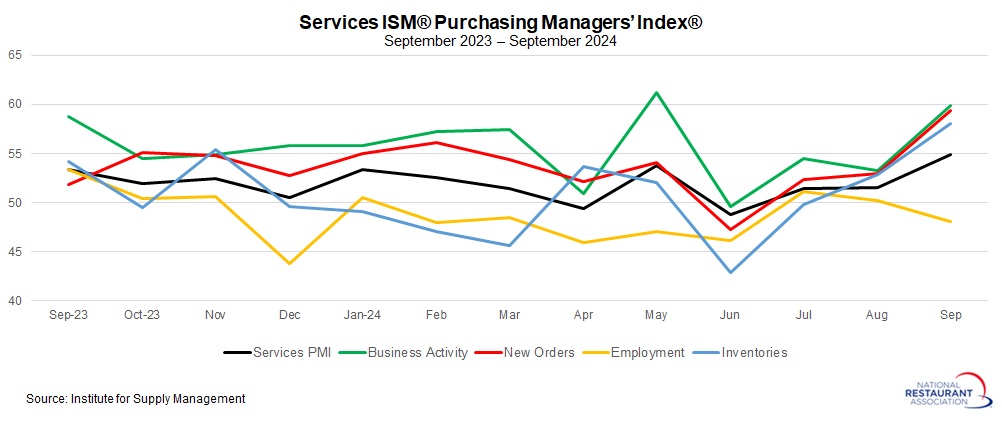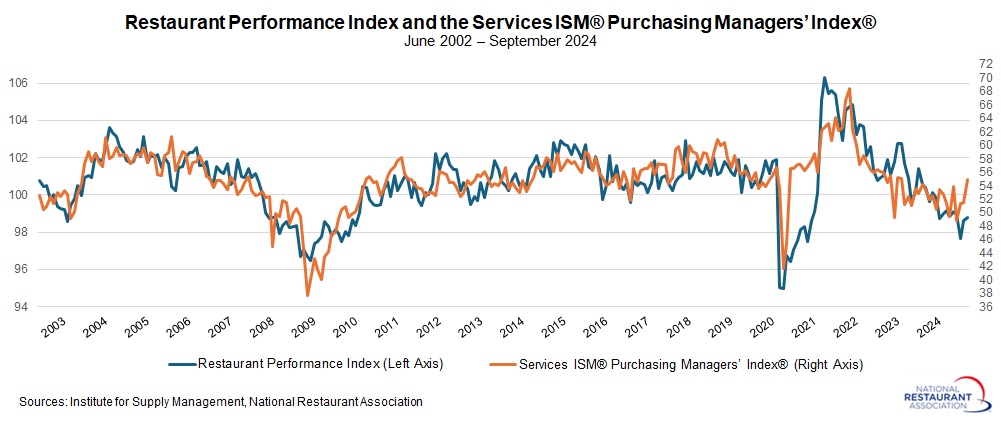Research
October 03, 2024
ISM: Service-Sector Growth Strengthened in September
Dr. Chad Moutray
The Institute for Supply Management reported a notable increase in service-sector confidence for September. The Services ISM® Purchasing Managers’ Index® rose from 51.5 in August to 54.9 in September, marking its highest level since February 2023. Index readings above 50 indicate expansion compared to the previous month, while values below 50 signal contraction. Survey respondents cited improved business conditions (up from 53.3 to 59.9) and a surge in new orders (up from 53.0 to 59.4), with both metrics growing at their fastest rates since early 2023.
These results suggest a positive outlook for service-sector businesses and the broader U.S. economy, which have both faced headwinds over the past few years. However, not all indicators were as strong. The employment index declined from 50.2 to 48.1, indicating softness in hiring, while prices increased from 57.3 to 59.4—the fastest pace of growth since January. Comments from survey participants reflected mixed perspectives on the economic environment, highlighting ongoing concerns about elevated interest rates and political uncertainty.

For restaurant operators, this report from the Institute for Supply Management might seem tangential. Although accommodation and foodservice businesses are part of the survey, the services sector encompasses a wide range of industries, making it less immediately relevant to restaurant-specific conditions.
Still, a rise in service-sector sentiment, as measured by the Services ISM® Purchasing Managers’ Index®, often signals positive outcomes for restaurants based on historical trends. There is a strong correlation between this measure and the National Restaurant Association’s Restaurant Performance Index (RPI), which rose 1.0% in August. If this pattern holds, another increase in the RPI could be expected for September.
The National Restaurant Association will continue to monitor industry conditions closely, particularly the relationship between the RPI and the broader services sector's performance, as indicators suggest resilient growth moving forward.

The Institute for Supply Management reported a notable increase in service-sector confidence for September. The Services ISM® Purchasing Managers’ Index® rose from 51.5 in August to 54.9 in September, marking its highest level since February 2023. Index readings above 50 indicate expansion compared to the previous month, while values below 50 signal contraction. Survey respondents cited improved business conditions (up from 53.3 to 59.9) and a surge in new orders (up from 53.0 to 59.4), with both metrics growing at their fastest rates since early 2023.
These results suggest a positive outlook for service-sector businesses and the broader U.S. economy, which have both faced headwinds over the past few years. However, not all indicators were as strong. The employment index declined from 50.2 to 48.1, indicating softness in hiring, while prices increased from 57.3 to 59.4—the fastest pace of growth since January. Comments from survey participants reflected mixed perspectives on the economic environment, highlighting ongoing concerns about elevated interest rates and political uncertainty.

For restaurant operators, this report from the Institute for Supply Management might seem tangential. Although accommodation and foodservice businesses are part of the survey, the services sector encompasses a wide range of industries, making it less immediately relevant to restaurant-specific conditions.
Still, a rise in service-sector sentiment, as measured by the Services ISM® Purchasing Managers’ Index®, often signals positive outcomes for restaurants based on historical trends. There is a strong correlation between this measure and the National Restaurant Association’s Restaurant Performance Index (RPI), which rose 1.0% in August. If this pattern holds, another increase in the RPI could be expected for September.
The National Restaurant Association will continue to monitor industry conditions closely, particularly the relationship between the RPI and the broader services sector's performance, as indicators suggest resilient growth moving forward.

More from the Association's economists:
-
Research
Restaurants projected to add 490k seasonal jobs this summer
May 21, 2025An uptick in the restaurant industry’s prime labor pool will likely support hiring for the summer season. -
Research
New Association Website Spotlights Restaurant Jobs and Career Paths
May 19, 2025 -
Research
Elevated costs continue to pressure restaurant profitability
May 15, 2025Total restaurant input costs soared 30% since before the pandemic.